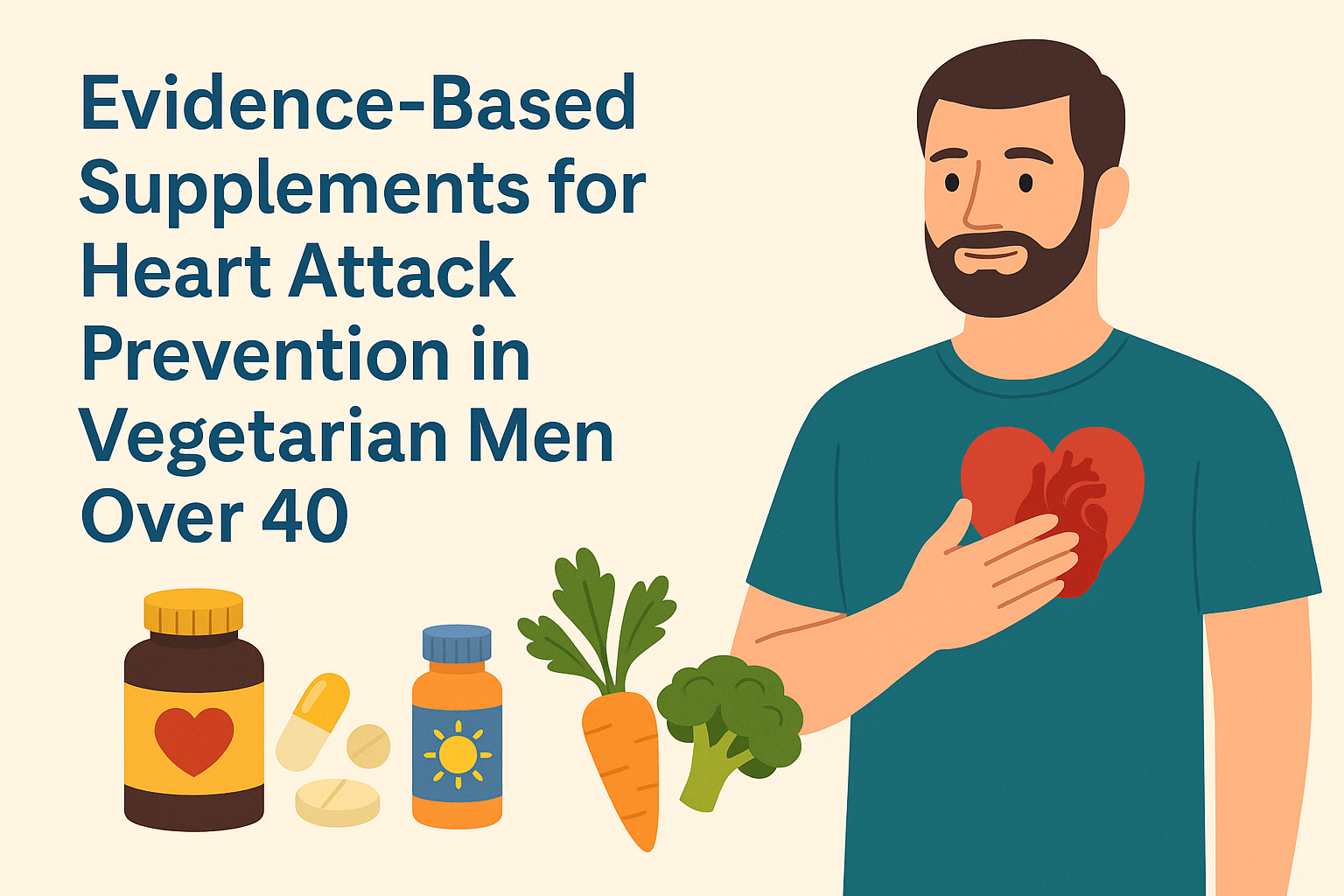Heart disease is the leading cause of death globally, and men over the age of 40 with a family history of cardiovascular conditions face heightened risk. While a healthy vegetarian diet, regular exercise, and lifestyle modifications form the foundation of prevention, targeted supplementation can offer critical support. This blog explores evidence-based allopathic and Ayurvedic supplements that may help reduce the risk of heart attacks in vegetarian men over 40.
🌿 Allopathic (Nutritional) Supplements
1. Omega-3 Fatty Acids (EPA & DHA)
- Mechanism: Reduces inflammation, lowers triglycerides, improves arterial function, and stabilizes heart rhythms.
- Dose: 500–1,000 mg/day (combined EPA + DHA). Use algae-based omega-3s for vegetarian sources if you can’t take fish oil supplements.
- Evidence: Studies show omega-3s can reduce cardiac death and stroke, especially in those with elevated triglycerides.
- Tip: Choose high-quality algal oil capsules with at least 250 mg EPA + DHA per serving.
2. Coenzyme Q10 (CoQ10)
- Mechanism: Supports mitochondrial energy in heart cells, reduces oxidative stress, improves endothelial function and reduces mortality from cardiovascular causes.
- Dose: 100–200 mg/day (with food, preferably in softgel form).
- Evidence: The Q-SYMBIO trial showed reduced major cardiovascular events in patients supplementing CoQ10.
- Tip: Use ubiquinol (reduced form) for better absorption in older adults.
3. Magnesium (Citrate or Glycinate)
- Mechanism: Regulates blood pressure, supports heart rhythm, prevents arterial calcification.
- Dose: 300–400 mg/day (in divided doses).
- Evidence: Associated with lower blood pressure, reduced arrhythmias, and lower cardiovascular risk.
- Tip: Avoid magnesium oxide (poor absorption); use glycinate or citrate forms.
🌿 Ayurvedic & Herbal Supplements
4. Arjuna (Terminalia arjuna)
- Mechanism: Strengthens heart muscle, improves circulation, reduces angina, antioxidant and anti-atherogenic.
- Dose: 500 mg 2–3 times/day (standardized extract).
- Evidence: Clinical trials show reduced angina and improved left ventricular function.
- Tip: Choose standardized bark extract capsules for consistent results.
5. Ashwagandha (Withania somnifera)
- Mechanism: Reduces stress hormones (like cortisol), improves lipid profiles, and supports blood pressure regulation.
- Dose: 300–600 mg/day of standardized extract.
- Evidence: Demonstrated stress reduction, lower blood pressure, and improved cholesterol levels.
- Tip: Take with meals to avoid digestive upset.
6. Garlic (Allium sativum)
- Mechanism: Lowers blood pressure, reduces cholesterol, prevents platelet aggregation.
- Dose: 600–1,200 mg/day (standardized aged garlic extract).
- Evidence: Meta-analyses show significant reductions in blood pressure and cholesterol [8].
- Tip: Use odorless aged garlic extract to avoid smell and ensure standardization.
⚠️ Safety Considerations
- Monitor blood pressure and glucose if combining these supplements with medications.
- Consult your healthcare provider if you are on blood thinners, antihypertensives, or statins.
- Always use high-quality, third-party tested supplements.
📊 Conclusion
For vegetarian men over 40—especially with a family history of heart disease—the right combination of evidence-based supplements can significantly strengthen your heart’s defenses. Incorporating Omega-3s, CoQ10, Magnesium, Arjuna, Ashwagandha, and Garlic into your regimen may offer both preventive and therapeutic benefits.
As always, these supplements are most effective when paired with a heart-smart lifestyle: plant-based nutrition, regular exercise, stress management, quality sleep, and routine medical checkups.
Disclaimer: This blog is for educational purposes only. Consult your physician before starting any new supplement, especially if you have existing health conditions or are taking medications.
📚 References
- Khan SU, Lone AN, Khan MS, Virani SS, Blumenthal RS, Nasir K, Miller M, Michos ED, Ballantyne CM, Boden WE, Bhatt DL. Effect of omega-3 fatty acids on cardiovascular outcomes: A systematic review and meta-analysis. EClinicalMedicine. 2021 Jul 8;38:100997.
- Rabanal-Ruiz Y, Llanos-González E, Alcain FJ. The Use of Coenzyme Q10 in Cardiovascular Diseases. Antioxidants (Basel). 2021 May 10;10(5):755.
- Mortensen SA, Rosenfeldt F, Kumar A, Dolliner P, Filipiak KJ, Pella D, Alehagen U, Steurer G, Littarru GP; Q-SYMBIO Study Investigators. The effect of coenzyme Q10 on morbidity and mortality in chronic heart failure: results from Q-SYMBIO: a randomized double-blind trial. JACC Heart Fail. 2014 Dec;2(6):641-9.
- Rosique-Esteban N, Guasch-Ferré M, Hernández-Alonso P, Salas-Salvadó J. Dietary Magnesium and Cardiovascular Disease: A Review with Emphasis in Epidemiological Studies. Nutrients. 2018 Feb 1;10(2):168.
- Dwivedi S, Chopra D. Revisiting Terminalia arjuna – An Ancient Cardiovascular Drug. J Tradit Complement Med. 2014 Oct;4(4):224-31.
- Wiciński M, Fajkiel-Madajczyk A, Kurant Z, Liss S, Szyperski P, Szambelan M, Gromadzki B, Rupniak I, Słupski M, Sadowska-Krawczenko I. Ashwagandha’s Multifaceted Effects on Human Health: Impact on Vascular Endothelium, Inflammation, Lipid Metabolism, and Cardiovascular Outcomes-A Review. Nutrients. 2024 Jul 31;16(15):2481.
- Ernst, E., Stevinson, C., Pittler, M.H. (2002). Meta-analyses of garlic for hypercholesterolemia. In: Schulz, V., Rietbrock, N., Roots, I., Loew, D. (eds) Phytopharmaka VII. Steinkopff, Heidelberg. https://doi.org/10.1007/978-3-642-57528-0_13

Akanksha Sharma
Dr. Akanksha Sharma, Head Writer and creator of AtoZ of Pregnancy, is dedicated to empowering women, parents, and families through 360-degree knowledge. She and her team provide evidence-based advice to guide families through pregnancy, parenting and beyond.






